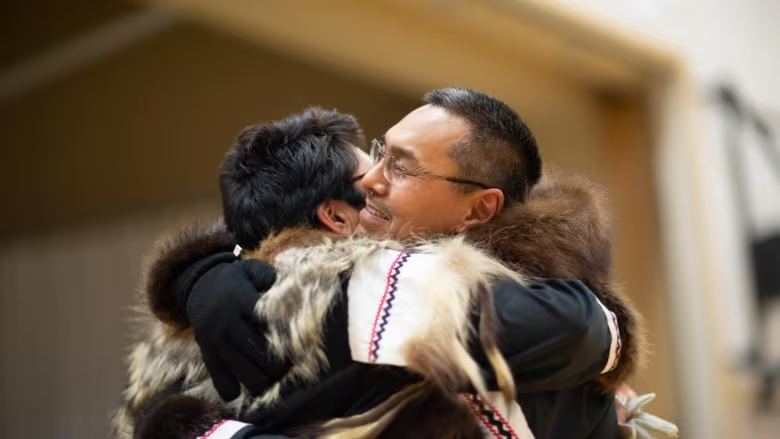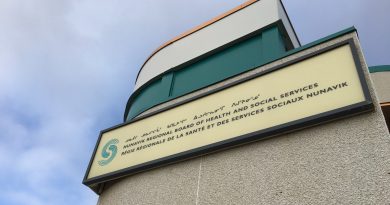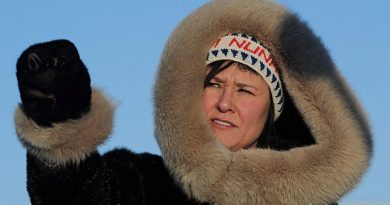Family hopeful after minister says Indigenous people have right to move freely

Federal immigration minister said it should be easier for Indigenous people to cross international borders
A woman in Aklavik, N.W.T., whose Inupiaq husband has been threatened with deportation says she’s very happy that the federal immigration minister has said he wants to make it easier for Indigenous people to cross international borders.
“When I heard that announcement the other day me and my husband watched it and we smiled, and I was saying: ‘Yes, yes, yes. Finally somebody’s listened to us,'” Carol Oyagak told CBC Radio’s The Trailbreaker.
In an interview with CBC News late last month, Immigration Minister Marc Miller said he wants to make it easier for Indigenous people to cross borders that have divided their homelands and families for generations.
Miller said Canada should recognize Indigenous people have an inherent right to move freely across international boundaries.
‘This is stressful’
Oyagak says if that should come to pass she’d probably cry for a week from the emotional release “because this is stressful.”
Her husband, Herman, travelled a traditional route by snowmobile in 2018 to come live with her in Aklavik, about 200 kilometres north of the Arctic circle. Then on March 24, 2020, the RCMP arrested him.
The Canada Border Services Agency moved to deport him back to Alaska, before the deportation order was deferred in 2021.
A lawyer for Oyagak said at the time that his right to live in Aklavik with his wife and family flows from the “rights of Indigenous [people] to engage in their traditional practices, even where that involved crossing borders in order to hunt, fish, participate in celebrations, marry, and engage in cross-familial relationships or activities.”
Oyagak was deemed inadmissible to Canada due to criminality, lawyer Nick Sowsun said in 2021.
He was convicted in 2015 in Alaska of criminal mischief for property damage under $250.
Waiting in limbo
After meeting Carol at a drum dance festival in Alaska, Sowsun said Oyagak became a respected member of his community.
“Together, Herman and Carol started a new life,” Sowsun said at the time. “Herman became sober, deepened his connections to his traditions and culture, and he became rehabilitated.”
Carol Oyagak said Thursday that without the change the family can only wait — for instance, Herman isn’t eligible for Canadian health care.
A senior federal government source told CBC News last month that the government is considering both a ministerial directive and amendments to the Immigration and Refugee Protection Act that would exempt Indigenous people whose traditional homelands extend beyond Canada’s borders from Indigenous people.
A government source said the federal government is looking to present a solution next year.
Miller’s commitment is part of the federal government’s roadmap for implementing the United Nations Declaration on the Rights of Indigenous Peoples.
‘It’s our right’
Miller, who was shuffled from the Crown-Indigenous relations portfolio to immigration over the summer, said there’s immense institutional resistance within the federal government, but he’s determined to get the job done.
Miller acknowledges the United States is ahead of Canada in its approach to Indigenous rights and border mobility.
The U.S. recognizes the historical clauses of the Jay Treaty, which was signed by the U.K. and U.S. in 1794, before Confederation.

The treaty states that Native Americans may travel freely across the international boundaries and Indigenous Peoples in Canada are entitled to enter the U.S. freely to work, study, retire, invest or immigrate.
Canada doesn’t recognize those rights.
“It’s our right,” Carol Oyagak said Thursday. “We’ve always travelled back and forth between Alaska and Canada. And we’re always going to continue doing it.”
With files from Hilary Bird and Olivia Stefanovich
Related stories from around the North:
Canada: UN high seas treaty praised by Inuit Circumpolar Council, Eye on the Arctic
Norway: Sami-led project seeks to revitalize Indigenous education across Arctic Europe, Eye on the Arctic
Russia: Another illegal crossing, Norway considers new means at Europe’s last unbarred border with Russia, The Independent Barents Observier
United States: Russian, Chinese vessels near Alaska reminder of ‘new era of aggression’: Senators, Eye on the Arctic



